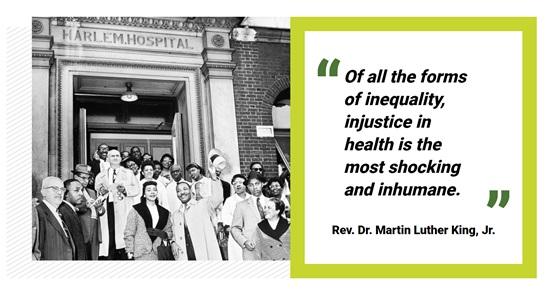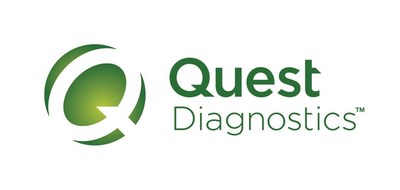Working to Bridge the Health Equity Gap in Underserved Communities
Quest for Health Equity Leader Ruth Clements Reflects on Key Lessons Learned

The Dr. Martin Luther King, Jr. holiday marks a National Day of Service and an important time of reflection. In 1966 Rev. Dr. Martin Luther King, Jr. spoke at the National Convention of the Medical Committee for Human Rights on the deep healthcare disparities that disproportionately affected people of color and lower income populations in the United States and said, “Of all the forms of inequality, injustice in healthcare is the most shocking and inhumane.”
Unfortunately, nearly 60 years later these gaps in health care are still present. That’s why I am proud to be part of the Quest for Health Equity (Q4HE) team, an over $100M commitment focused on providing a combination of donated testing services, education programs, partnerships, and funding to support initiatives to close the gap in healthcare disparities in underserved communities. The last year and a half has been one of the most trying and difficult times that we have faced -- as a company, a country, and a planet. During these unprecedented times, I’m very proud of how Quest has – and continues to – rise to meet the challenges brought on by the pandemic and other recent historical events.
Through our Q4HE initiative, we’ve provided significant support to address the disproportionate impacts that COVID-19 has had on underserved communities of color. In doing so, we’ve found ways to create greater health equity by collaborating with 18 organizations – from small medical clinics in underserved communities to long-established, national nonprofits – all focused on improving access to better health outcomes and increasing health equity across the country.
In honor of Rev. Dr. Martin Luther King, Jr., I wanted to take a moment to pause and reflect on some of the key lessons we’ve learned since we first established Q4HE in 2020. While we’re still in the early stages of this work, we are committed to continuing to support historically marginalized communities and will apply these key insights to enhance our work moving forward and to drive greater impact in our fight to close the gaps in health equity.
- Build a Dedicated Team to Deliver the Vision
The scope of our Q4HE commitment is significant, and from the beginning our Chairman & CEO Steve Rusckowski knew that we could not achieve the goals of Q4HE by doing this work in off hours. Instead, we needed leaders who are focused, full time, on this initiative, who have the resources to drive this critical work forward to create significant results.
With this in mind, we selected leaders from across Quest to drive this work. This includes myself, Mandell Jackson – Vice President/General Manager for Quest for Health Equity, and eight other dedicated team members who are committed to helping underserved communities. Our team is accountable to Steve and other members of the senior management team and provide monthly status updates on our progress within each initiative.
Through the team’s focused efforts, the work of our partners, and our regional operations teams who have played a critical role in supporting local testing events, we’ve established a path forward where Quest can build lasting solutions to help close the gap in health inequities. Ongoing leadership and hands on engagement will be critical to achieving long-term, meaningful outcomes.
- Build Diverse Partnerships to Affect Change
When we established Q4HE to help address and increase health equity, we knew that finding committed partners to execute this critical work would be essential. Our first partnership, which started with a focus on COVID-19 testing in underserved communities, was with Choose Healthy Life (CHL), a nonprofit focused on addressing critical health issues in Black communities.
Our efforts began in five of the nation’s hardest hit Black communities - New York City, Atlanta, Newark, Washington D.C. and Detroit - to build trust and take action to combat COVID-19. CHL engaged leading Black Clergy including Reverends Al Sharpton and Calvin O. Butts III, and Reverend and Senator Raphael Warnock. These leaders advocated for their constituents to attend events at their churches to gain educational information, testing and, when available, vaccinations. These partnerships, supported by these trusted leaders, led to series of events at community churches and distribution of over 43,000 COVID vaccinations in historically underserved, predominantly Black communities. Since the program’s inception in January 2021, CHL has hosted over 500 vaccination and testing events for underserved communities.
In Puerto Rico, we’ve supported Salud Integral en la Montaña, Inc., (SIM), a Federally Qualified Health Center (FQHC), to create the Island’s first long haul COVID-19 clinic to provide critical services to territory residents.
We made a significant commitment to the American Heart Association to support efforts to expand research and mentorship opportunities for Black and Hispanic scholars and drive a new hypertension management initiative to help provide evidence-based high blood pressure resources to Federally Qualified Health Centers (FQHC) that serve under-resourced communities most severely impacted by the COVID-19 pandemic.
We also recently conducted Bridge to Health, a community health and wellness program in New Mexico to connect community members to no-cost health screenings, educational resources, wellness testing and local services. Our events in Las Cruces and Albuquerque offered a range of free resources and support such as comprehensive wellness testing including Blueprint for Wellness, health screenings; dental and vision screenings; COVID-19 vaccinations; groceries; healthy recipes and free transportation to over 2,100 local residents.
- Listen to and Learn from Those You Seek to Help
Throughout Q4HE’s first year, we’ve learned that it’s critical to first listen in order to learn from the communities we seek to help. Whether building partnerships with local churches or engaging healthcare professionals who work with local schools, carefully hearing the needs of local residents and local groups that provide needed services is essential to inform efforts to expand Q4HE’s impact. By doing so, we can better understand the challenges associated with addressing health equity from language barriers to transportation and technology needs, to more affordable care, and how we can be part of innovative efforts, large and small, to create lasting solutions.
- Share Stories to Build Momentum and Increase Impact
When we kicked off Q4HE’s first initiative, we partnered with CHL, the Clergy, and the United Way of New York City to hold events at local churches. And we recognized that the stories that came from these events could help to build trust more broadly and increase positive impacts across numerous communities.
Here, we used videos, photos and testimonials from participants - including pictures of Reverend Sharpton receiving a COVID-19 test and Dr. Fauci and First Lady Dr. Jill Biden attending a Choose Healthy Life event. We also worked with trusted leaders like civil rights activist Dr. Ben Chavis, who authored an article on the need for Black communities to have access to – and trust in – COVID-19 testing and vaccines.
Through storytelling, we found ways to expand the reach of trusted voices to engage people in their local communities and amplify our impact; and we’ll continue to do so as we move Q4HE forward.
- Encourage The Broader Healthcare Industry to Take Action
Because of our size and the insights we continue to gain, we can amplify positive impacts on health equity by engaging others in the healthcare industry. From op-eds to webinars to symposiums, we’ve been doing just that. For example, we’ve sponsored two virtual panel discussions hosted by Modern Healthcare, the largest and most comprehensive media platform in the healthcare industry, to inspire their audience to take action to close critical gaps in healthcare. Quest convened community healthcare leaders including Nancy Brown, Chief Executive Officer of the American Heart Association; Dr. Gary Puckrein, President and Chief Executive Officer of the National Minority Quality Forum; and Kerry Hydash, President and Chief Executive Officer of the Family HealthCare Network; to share their insights on effectively addressing disparities to create greater health equity through individual and collaborative efforts. To view the replay of our webinar “Collaborating to address health inequities in underserved communities,” click here.
Quest Chairman, CEO and President Steve Rusckowski was also interviewed for an Executive Insights article featured in Modern Healthcare where he shared the reasons for the creation of Quest for Health Equity, lessons learned on developing successful initiatives to address health disparities, and the critical need for the healthcare industry to collaborate more effectively to deliver better health outcomes in underserved communities.
These lessons inform our work to support the creation of a more equitable healthcare landscape for all. In the months and years to come, we will also create opportunities for our colleagues at Quest to engage in this community work and move Q4HE forward. And we’ll continue to learn from our grantees to drive impact and apply the many lessons learned to scale solutions to help communities in need. I am confident that with the support of our partners and commitment of our team we will help close the gap in health disparities and create greater health equity for all. In the spirit of Rev. Dr. Martin Luther King, Jr. and his dream of equality in all forms, we will remain steadfast in our mission to bridge the health equity gap in underserved communities.

